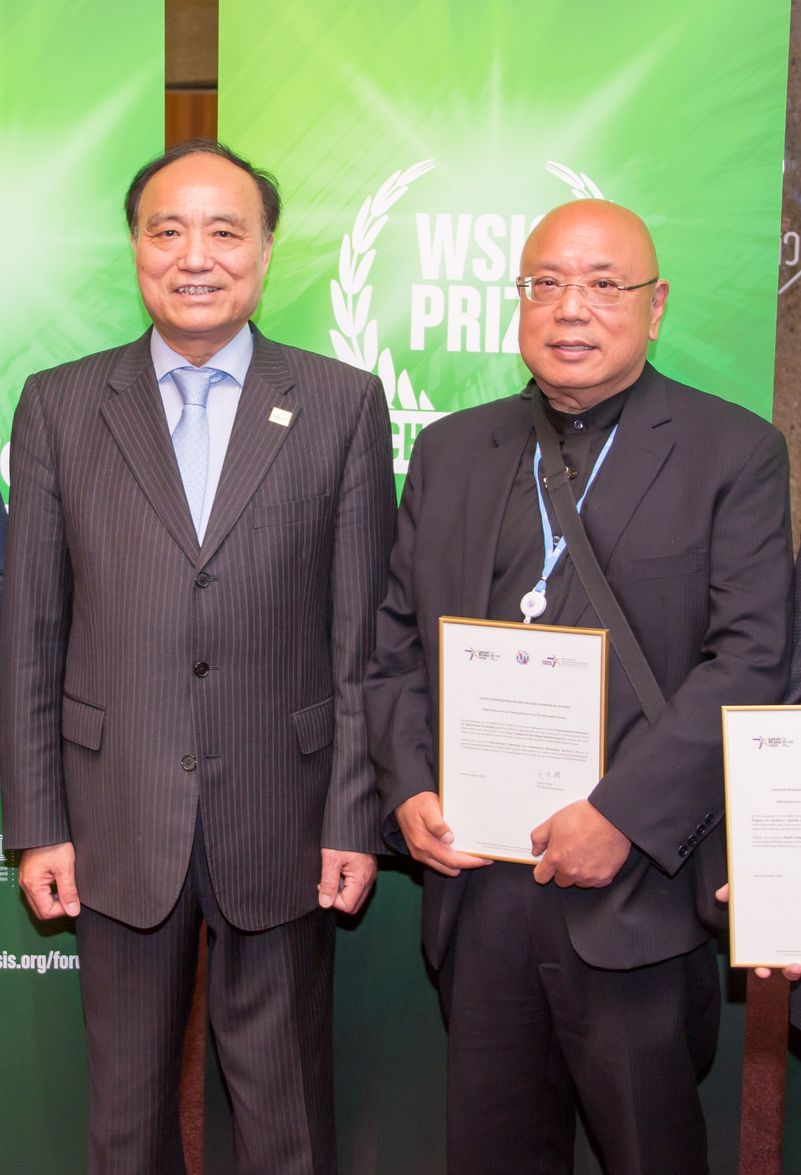MEDIA RELEASE
IFIP Thought Leader to Present to United Nations
Wednesday 11 October 2017 – New York USA – IFIP IP3 Board Director Stephen Ibaraki will today present to the United Nations on how Artificial Intelligence (AI) and machine learning technologies will dramatically change the world in which we live.
Mr Ibaraki, who is a key decision-maker on the professionalism arm (IP3) of the global federation of ICT societies (IFIP) and who also founded ITU’s AI for Good Global Summit, will present to a joint meeting of the UN GA Second Committee and Economic and Social Council (ECOSOC), discussing the topic: “The Future of Everything – Sustainable Development in the Age of Rapid Technological Change”.
As part of his presentation, Mr Ibaraki will highlight the significant role AIs will play in shaping the future in every sphere of endeavour.
“AI innovation will be central to the achievement of the United Nations’ Sustainable Development Goals (SDGs) and help to solve humanity’s grand challenges, capitalizing on the unprecedented quantities of data now being generated on human health, commerce, communications, transportation, migration and more,” he said.
Mr Ibaraki will explain the concept of C 5 A, where human Cognition is replaced or enhanced by Algorithms, AI Assistance, Augmentation, Automation, and Autonomous intelligence. He will also share predictions that suggestion AIs will drive a 55 per cent gain in GDP between 2017 and 2030.
China is currently leading the race to develop commercial AIs and is set to achieve a 26% rise in GDP (worth $7 trillion) by 2030, followed by North America with an increase of 14.5% of GDP or $3.7 trillion.
Mr Ibaraki said that when the UN released the eight Millennium Development Goals in 2000m it did not anticipate the impact of technology such as the internet, broadband, WIFI, smartphones/tablets, cloud computing, Big Data and Analytics, social media, social networks, cybersecurity challenges and artificial intelligence through machine learning and deep learning.
“Machine learning and reasoning can extend medical care to remote regions through automated diagnosis and effective exploitation of limited medical expertise and transportation resources (SDG3),” he said. “AI will also serve as a key resource in curbing greenhouse gas emissions in urban environments and supporting the development of smart cities (SDGs 11 & 13), while global partnerships (SDG 17) will offer crucial support to our pursuit of all of these goals involving the UN family, governments, industry, academia, civil society and more.“
Mr Ibaraki believes the UN and its agencies can play a key role by facilitating important conversations between government, academia, industry, media, and civil society, pointing to the ITU AI for Good Global Summit this year that brought together 20 other UN organizations plus industry, government including 47 global media and top voices from all sectors.
He suggests that AI can play a role in addressing each of the UN SDGs:
- SDG 1: No poverty – AI will provide real-time resource allocation through satellite mapping and data analysis of poverty.
- SDG 2: Zero hunger – Agriculture productivity is increased through predicative analysis from imaging with automated drones and from satellites. Nearly 50% of crops are lost through waste, over consumption and production inefficiencies. Livestock production losses are 78%.
- SDG 3: Good health and well-being – Preventative healthcare programs and diagnostics are significantly improved through AI leading to new scientific breakthroughs. There are 8 billion mobile devices with smartphone cameras being used to diagnose heart, eye and blood disorders; microphone and motion sensors yielding insights into bone density and osteoporosis – and manage cancer, diabetes and chronic remote care.
- SDG 4: Quality education – Virtualized, intelligent mentors and responsive personalized learning is revolutionizing education, improving participation and outcomes – all powered by AI. Online providers such as Coursera have AI-produced granular information for effective learning. Big data analysis is improving graduation rates of low-income and first-generation college students by 30%, spotting warning signs before dropout to allow targeted interventions.
- SDG 5: Gender equality – Identifying and correcting for gender bias, further automating/augmenting tasks, AI is empowering women for growth and new opportunities.
- SDG 6: Clean water and sanitation – The IoT and sensors feeding into the AI of Everything are predicting sanitation and consumption patterns for improved safe water and sanitation provisioning.
- SDG 7: Affordable and clean energy – Green energy in all its forms is continuously improving for increased output and more efficiency by AI real-time analysis.
- SDG 8: Decent work and economic growth – Despite legitimate concerns about automation replacing jobs, AI assistance (tasks), augmentation (decisions), targeted automation (tasks), autonomous systems (decisions) with intelligent devices can improve the work environment, increase productivity, and be a significant driver of economic growth.
- SDG 9: Industry innovation and infrastructure – New hybrid manufacturing incorporating AI, IoT sensors, and 4D printing is reshaping industries, representing the ‘A Triple C’, and yielding exponential innovation unprecedented in world history.
- SDG 10: Reduced inequalities – Human augmentation using AI-inspired devices both internally and externally provides super senses and knowledge, enhanced physical capabilities, corrects disabilities yielding a more equal and inclusive society.
- SDG 11: Sustainable cities and communities – AI of Everything, the digital AI mesh, fed by the ubiquitous IoT, smart devices, and wearables, is already impacting smart cities and helping to create sustainable communities.
- SDG 12: Responsible consumption and production – AI is yielding optimal consumption and production levels with vertical green farms, eliminating waste and vastly improving yields and resource efficiency.
- SDG 13: Climate action – Climate change data analysis and climate modeling infused with AI predicts climate-related problems and disasters.
- SDG 14: Life below the water – Pattern recognition can track marine-life migration, population levels, and fishing activities to enhance sustainable marine ecosystems and combat illegal fishing.
- SDG 15: Life on land – Pattern recognition, game theory, and wide applications of computer science can track land-animal migration, population levels, and hunting activities to enhance sustainable land ecosystems and combat illegal poaching.
- SDG 16: Peace, justice, and strong institutions – Thoughtful application of AI can reduce discrimination, corruption, and drive broad access to e-government, personalized, and responsive intelligent services. AI can significantly stay ahead of global cyberthreats, the Cyber Kill Chain, in a manner not possible before.
- SDG 17: Partnerships for goals – Multi-sectoral collaboration is essential for the safe, ethical, and beneficial development of AI. The UN can play a key role here by bringing together governments, industry, academia and civil society to explore the responsible development of human-centric AI in solving humanity’s grand challenges.
ENDS
About IFIP
IFIP, the International Federation for Information Processing, is the global professional federation of societies and associations for people working in Information and Communications Technologies and Sciences. Established under the auspices of UNESCO in 1960 and recognised by the United Nations, IFIP represents ICT professional associations from more than 50 countries and regions with a total membership of over half a million. It also brings together more than 3,500 scientists from industry and academia, organising them into over 100 Working Groups and 13 Technical Committees to conduct research, develop standards and promote information sharing. Based in Austria, IFIP organises and supports over 100 conferences each year, fostering the distribution of research and knowledge to academics and industry practitioners alike.
Website: http://ifip.org
Latest news: http://ifipnews.org
Twitter: http://twitter.com/ifipnews
LinkedIn:
https://www.linkedin.com/company/ifip—international-federation-for-information-processing
About IP3
The International Professional Practice Partnership (IP3) is a project of the International Federation for Information Processing (IFIP), the global body for ICT professionals. IP3 is leading the development of the global IT profession by providing a platform to will help shape and implement relevant policies to foster professionalism in ICT worldwide. Our mission is to establish a global partnership that will strengthen the ICT profession and contribute to the development of strong international economies by: defining international standards of professionalism in ICT; creating infrastructure to encourage and support the development of both ICT practitioners and employer organisations; and give recognition to those who meet and maintain the required standards for knowledge, experience, competence and integrity. To carry out this mission, IP3 works closely with member bodies and partners who share our commitment to creating a sound global ICT profession. www.ipthree.org
Twitter: http://twitter.com/IP3news
Media contacts






